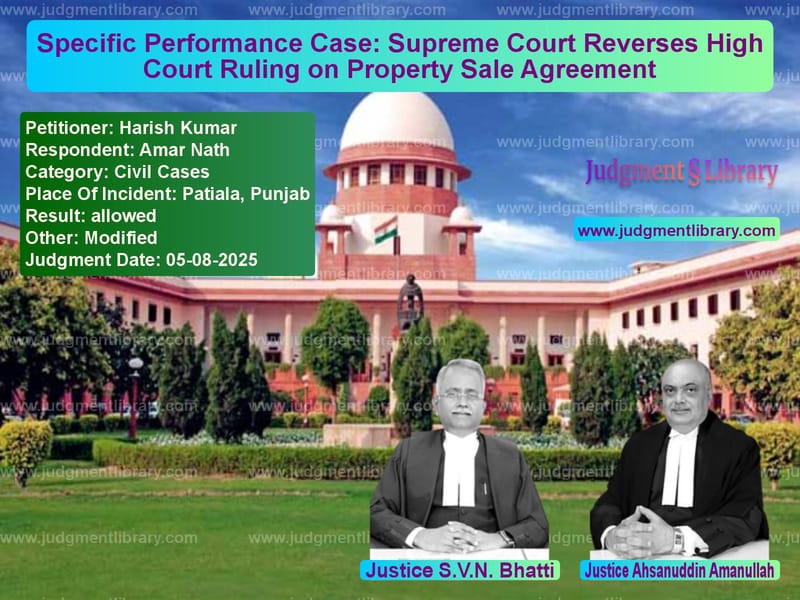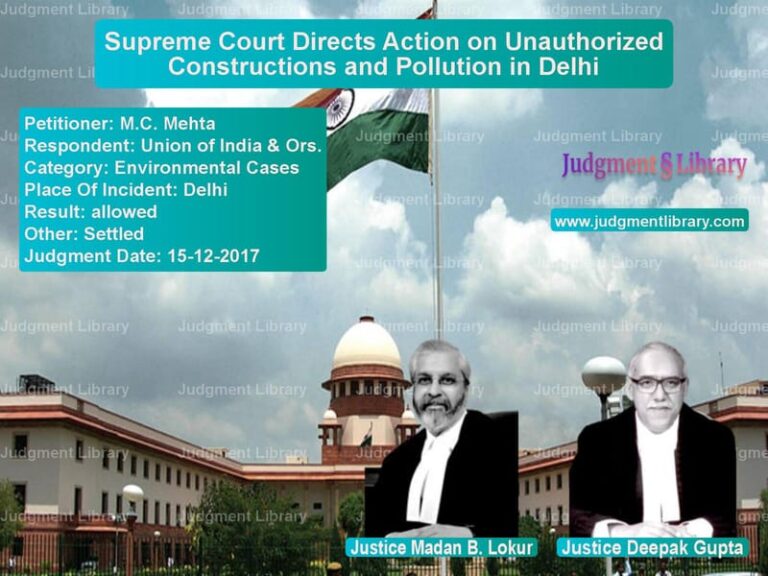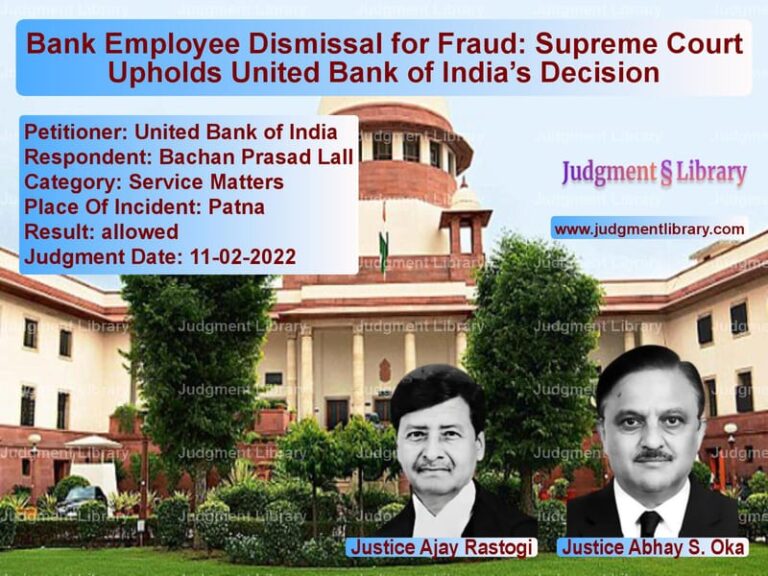Specific Performance Case: Supreme Court Reverses High Court Ruling on Property Sale Agreement
In a significant property dispute that spanned over two decades, the Supreme Court of India recently delivered a judgment that highlights the critical importance of proving the existence of a valid agreement in specific performance cases. The legal battle involved Harish Kumar, who appealed against a High Court decision that had reversed concurrent findings of two lower courts in his favor.
The case originated from a suit filed by Amar Nath and another person (since deceased and represented through legal representatives) seeking specific performance of an alleged agreement to sell dated February 12, 1999. The plaintiffs claimed that Harish Kumar had agreed to sell his house bearing No. B-35/229 at Jattanwala Chauntara, Sirhindi Bazar, Patiala for a consideration of Rs. 70,000. According to their claim, the defendant had received Rs. 55,000 as part consideration and had put them in possession of the property. The agreement supposedly set October 20, 2000 as the deadline for obtaining the registered sale deed.
The plaintiffs alleged that they were present at the sub-registrar’s office on the due date, but the defendant failed to appear. Following this, they issued a legal notice on October 21, 2000, calling upon the defendant to receive the balance sale consideration and execute the registered sale deed. When this yielded no result, they filed the suit for specific performance and possession on November 18, 2000.
The Defendant’s Counter-Narrative
Harish Kumar presented a completely different version of events. He alleged that the plaintiffs had committed fraud and misrepresentation. His case was that he had borrowed a sum of Rs. 50,000 from the first plaintiff at an interest rate of 2.25% per month, and the plaintiff had obtained his signatures on blank stamp papers. The defendant claimed to have repaid the loan on July 25, 2000, and asserted that there was never any agreement between the parties to sell or purchase the suit property.
The defendant argued that the plaintiffs, who were professional moneylenders, had misused the blank signed papers to fabricate the suit agreement. He emphasized that the alleged sale consideration of Rs. 70,000 was disproportionately low compared to the property’s supposed market value of Rs. 4,04,000. The defendant also pointed out that he had no alternative accommodation, making the sale of his only house highly unlikely.
The Trial Court and First Appellate Court Decisions
The Trial Court dismissed the suit after considering the evidence presented by both parties. The court noted several crucial factors that cast doubt on the plaintiffs’ claims. The Trial Court found that the plaintiffs were professional moneylenders who followed the practice of obtaining signatures on blank papers from borrowers. The court also observed that the plaintiffs had failed to prove that the defendant had executed the agreement of sale.
The First Appellate Court upheld the Trial Court’s decision, providing additional reasoning for dismissing the suit. The appellate court observed that while the defendant had admitted his signatures on the document, he had consistently maintained that these signatures were obtained on blank papers at the time the loan was advanced. The court gave significant weight to the affidavits submitted by the attesting witnesses to the agreement, Devinder Dhaman and Harnek Singh, who stated that their signatures were obtained through fraudulent means and that the agreement was not executed in their presence.
The First Appellate Court also considered Exhibit D1, a receipt that revealed the plaintiffs’ practice of obtaining signatures on blank papers from their borrowers. The court found the defendant’s claim credible and noted that the plaintiffs had failed to establish that the agreement was duly executed by the defendant.
The High Court’s Reversal
The High Court, in a second appeal, reversed the concurrent findings of the two lower courts. The High Court placed great emphasis on the defendant’s admission that he had signed the agreement at five places and had written in his own handwriting regarding the receipt of Rs. 55,000 as earnest money. The court concluded that given these admissions, the defendant’s plea of having signed blank stamp papers could not be accepted.
The High Court also noted that the defendant, having worked as a typist in Patiala Courts for 15 years prior to the agreement, was well aware of the legal consequences of signing blank stamp papers and plain papers. The court discredited the affidavits of the attesting witnesses, observing that these witnesses were never examined in the witness box. The High Court relied heavily on the rent note and rent receipt that the defendant admitted executing, which indicated he had taken the disputed house on rent from the plaintiffs after the agreement to sell and had paid rent for a period.
Supreme Court’s Analysis and Reasoning
The Supreme Court, after hearing arguments from both sides, delivered a comprehensive judgment that carefully analyzed the evidence and legal principles involved. The court began by noting the distinction between burden of proof and onus of proof, citing its earlier decision in Anil Rishi v. Gurbakshi Singh, which held that “there is a distinction between burden of proof and onus of proof, and that onus of proof has greater force when the issue is which party is to begin forwarding evidence in support of a proposition.”
The court emphasized that in matters such as the present case, it is the onus of proof that is applied in determining whether the proof needed to enforce an agreement is made out by the respondents or not. The Supreme Court identified several critical flaws in the High Court’s reasoning and the plaintiffs’ case.
The court noted that “the respondents did not examine the witnesses to the alleged Suit Agreement or the rent deed. The evidence of the respondent, as PW1, remains self-serving evidence and cannot be wholly relied upon as evidencing the execution of Exhibit P1– the Suit Agreement.” This observation highlighted the fundamental weakness in the plaintiffs’ case – the lack of independent corroboration for their claims.
The Supreme Court also pointed out that “the crucial aspect that was missed in coming to a conclusion of misreading or misappreciation of evidence in the impugned judgement is that no steps have been taken by respondents to at least cross-examine the affidavit given in Exhibits D5 and D6.” This referred to the affidavits submitted by the attesting witnesses who had denied witnessing the agreement.
The court further observed the peculiar circumstances surrounding the possession of the property: “the respondent claims to have taken possession under Exhibit P1 and re-transferred possession to the appellant under a rent deed. In a circumstance such as the present, it is all the more a good requirement in law that the movement of possession from appellant to respondent has gone in the first instance, and secondly, re-transferred to the appellant by the respondent because the appellant was and is in possession of the Suit Premises. There is no evidence adduced by the first respondent.”
The Supreme Court relied on the principles established in Man Kaur (Dead) by LRs. v. Hartar Singh Sangha, which held that “to succeed in a suit for specific performance, the plaintiff has to prove (a) the existence of a valid agreement of sale, (b) that the defendant committed breach of contract; and (c) that the plaintiff was always ready and willing to perform his part of the obligations in terms of the contract.”
Applying these principles, the court concluded that “even if the respondents were ready and willing to perform their part of the obligations in the supposed Suit Agreement, they failed to prove the existence of a valid Suit Agreement.”
The Final Ruling and Compensation
The Supreme Court allowed the appeal and set aside the High Court’s judgment. However, the court also addressed the defendant’s admission that he had borrowed Rs. 50,000 from the plaintiffs. The court noted that “the onus to discharge the claim of returning the debt borrowed from the respondents rests on the appellant. The indebtedness of the appellant to the respondents can be accepted in the admission of the appellant. The appellant, to stay clear from the enforcement of the said debt, must prove discharge of the debt, in the manner known and accepted by the law. There is no evidence on the discharge of debt by the appellant.”
Recognizing that the defendant could not “have it both ways,” the court molded the relief and directed the appellant to pay Rs. 3,00,000 to the respondents within four weeks. This amount was significantly higher than the original loan amount of Rs. 50,000, possibly accounting for interest and the long duration of the legal dispute.
Legal Implications and Conclusion
This judgment reinforces several important legal principles in specific performance cases. First, it emphasizes that the existence of a valid agreement is fundamental to any claim for specific performance. Mere signatures on a document, without independent corroboration of the agreement’s terms and execution, may not be sufficient to prove a valid contract.
Second, the judgment highlights the importance of examining attesting witnesses in document execution cases. The Supreme Court criticized the plaintiffs for not examining the attesting witnesses or even cross-examining them on their affidavits that denied witnessing the agreement.
Third, the case demonstrates the court’s authority to mold relief according to the circumstances of the case. While the Supreme Court rejected the specific performance claim due to insufficient evidence of a valid agreement, it recognized the debt aspect and awarded compensation accordingly.
Finally, the judgment serves as a cautionary tale about the dangers of signing blank documents, even for someone familiar with legal procedures. The defendant’s admission that he signed blank papers, despite his experience as a court typist, nearly cost him his property, and ultimately resulted in a substantial financial liability.
The Supreme Court’s careful analysis of the evidence and application of legal principles ensured that justice was served, protecting property rights while acknowledging financial obligations. The case underscores the judiciary’s role in scrutinizing claims of specific performance, particularly when there are allegations of fraud and document fabrication.
Petitioner Name: Harish Kumar.Respondent Name: Amar Nath.Judgment By: Justice S.V.N. Bhatti, Justice Ahsanuddin Amanullah.Place Of Incident: Patiala, Punjab.Judgment Date: 05-08-2025.Result: allowed.
Don’t miss out on the full details! Download the complete judgment in PDF format below and gain valuable insights instantly!
Download Judgment: harish-kumar-vs-amar-nath-supreme-court-of-india-judgment-dated-05-08-2025.pdf
Directly Download Judgment: Directly download this Judgment
See all petitions in Specific Performance
See all petitions in Property Disputes
See all petitions in Contract Disputes
See all petitions in Judgment by S.V.N. Bhatti
See all petitions in Judgment by Ahsanuddin Amanullah
See all petitions in allowed
See all petitions in Modified
See all petitions in supreme court of India judgments August 2025
See all petitions in 2025 judgments
See all posts in Civil Cases Category
See all allowed petitions in Civil Cases Category
See all Dismissed petitions in Civil Cases Category
See all partially allowed petitions in Civil Cases Category







